Sorted by date Results 101 - 125 of 170
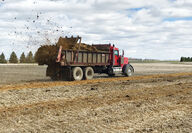
Using manure as fertilizer can lead to the spread of noxious and troublesome weeds. "It is a known fact that weed seeds pass unharmed through the digestive tracts of ruminant animals (cattle, sheep)," says Mary Keena, livestock environmental management specialist based at North Dakota State University's Carrington Research Extension Center. "This means that whatever weed seeds are in the feed or bedding you're using are still viable when they exit the animal as manure. "There is also a line of...
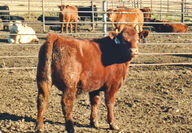
Calf abortions can be a major concern for cattle producers. An abortion is the discharge of the fetus prior to the end of the normal gestation period, according to Gerald Stokka, North Dakota State University Extension veterinarian and livestock stewardship specialist. Many abortions occur within the first 45 days of conception (called early embryonic death), and the embryos or fetuses are so small that they may not be seen. Other abortions may occur near normal calving time, and determining...
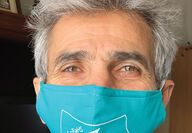
A statewide citizen science network is looking for volunteers for rain and snow reporting in North Dakota. These observers will measure rainfall, snowfall and snow depth as part of the Community Collaborative Rain, Hail and Snow (CoCoRaHS) Network. Observers also are encouraged to measure the water equivalent of the snow after it melts, although that is optional. "This is your chance to become part of the state's climatological history and contribute to an accurate flood potential forecast in...

Producers and others will have an opportunity to learn more about tile drainage during an online tile drainage design and management webinar North Dakota State University Extension is holding from 8:30 a.m. to noon March 25. "This tile design educational event is intended for agricultural producers and those interested in understanding basic design principles and agronomic practices for tile drainage, including utilizing subirrigation and managing the water table with control boxes," says Hans...

North Dakota growers continue to be the No. 1 producers of sunflowers in the U.S., harvesting 715,000 acres of the crop in 2020. Sunflowers are harvested for oil, confection uses and bird food. Each sunflower variety has distinctive agronomic characteristics that producers should consider when selecting a hybrid to grow. "Choosing a hybrid and using proper agronomic practices are important decisions a producer makes in raising a successful crop," says Hans Kandel, a North Dakota State...
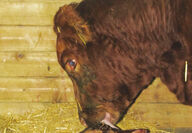
Winter and early spring calving can lead to health risks for the newborns, North Dakota State University Extension livestock specialists caution. This winter's mild weather has created calving conditions that are favorable to the producer and the livestock. However, colder temperatures and wind are still a risk to newborn calves. Hypothermia can result, which leads to delayed nursing, frozen ears, frozen feet and an increased risk of infectious disease. Calving indoors can alleviate some of...
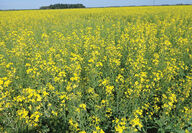
Producers and crop advisers will have an opportunity to learn more about canola production during the Getting it Right in Canola Production online conference that North Dakota State University Extension, with support from the Northern Canola Growers Association, is holding from 8:30 a.m. - noon Tuesday, March 16. Canola is a major oil crop in the northern Great Plains, particularly in North Dakota. In 2020, North Dakota accounted for nearly 1.5 million harvested acres, approximately 83% of all a...
Soybean producers and crop advisers will have an opportunity to learn about soybean production management issues during the 2021 Getting it Right in Soybean Production online conference that North Dakota State University Extension, with support from the North Dakota Soybean Council, is holding from 8:30 to 11 a.m. Wednesday, Feb. 17. “Crop production depends on many decisions, and new research-based production information is generated annually,” says Hans Kandel, Extension agronomist for broadleaf crops. “Therefore, it is important for produ...
The North Dakota State University Extension projected crop budgets for 2021 are available for the state’s producers, says Ron Haugen, NDSU Extension farm management specialist. The 2021 projected profits vary by region and crop. “The budgets are guides for large multicounty regions,” says Haugen. “Returns and costs can vary considerably between producers within a region. Also, the budgets estimate returns to labor and management with no consideration of price and yield variability or risk. A perfect comparison of crops is not achieved because...

On Feb. 11, the North Dakota 4-H Foundation will participate in the Dakota Medical Foundation's annual Giving Hearts Day, a 24-hour online fundraising event for charities in North Dakota and northwestern Minnesota. The North Dakota 4-H Foundation is a nonprofit organization that secures and manages financial resources to support and expand North Dakota's 4-H programs and educational opportunities in areas such as healthful living, engineering and technology, animal and plant sciences,...
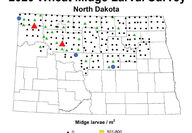
Soil samples in North Dakota indicate lower levels of overwintering wheat midge larvae (cocoons) for the 2021 season, says Janet Knodel, North Dakota State University Extension entomologist. A total of 2,050 soil samples were collected from 22 counties in the fall of 2020 to estimate the statewide risk for wheat midge in the 2021 field season. The distribution of wheat midge is based on unparasitized cocoons found in the soil samples. "The majority of the soil samples, 86%, had zero wheat midge...

North Dakota State University Extension has updated the Crop Compare program, which is a spreadsheet designed to compare cropping alternatives. The program uses the direct costs and yields from the 2021 projected crop budgets for nine regions of North Dakota, but producers are encouraged to enter the expected yields and input costs for their farm. The user designates a reference crop and enters its expected market price. Depending on the region, a broad selection of nine to 18 crops are...

Irrigation provides more consistent crop production on a year-to-year basis, allows growth of longer-season crops, diversifies the farm enterprise and provides a consistent supply of forage for animal operations. "However, managing an irrigation system around variable rain events can sometimes be a challenge for busy farmers," says Tom Scherer, North Dakota State University Extension agricultural engineer. To provide producers with some assistance, NDSU Extension is holding a virtual irrigation...
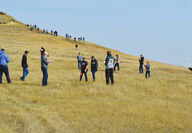
The Oliver County 4-H range judging team placed first in the senior division of the North Dakota 4-H and FFA range judging contest at Center. Team members are Breanna Hosman, Hebron; Olivia Klein, Max, and Reanna Schmidt, Katie Frank, Breanna Vosberg and Rylee Hintz, Center. Hosman received the Head of the Herd Award as the top-scoring individual in the 4-H division. The Oliver County team is coached by Rick Schmidt. The team will represent North Dakota at the National Invitational 4-H Range...
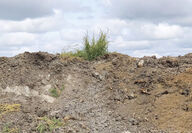
North Dakota producers need to be vigilant about keeping Palmer amaranth, a particular noxious weed, off their land, according to North Dakota State University Extension specialists. This weed has been found in new North Dakota counties every year since 2018, and 2020 was no exception. One source of introduction in 2020 was through contaminated grain screenings. Samples pulled from a pile of sunflower screenings detected up to 1,000 Palmer amaranth seeds per pound of screenings from one source....
The Oliver County 4-H range judging team placed first in the senior division of the North Dakota 4-H and FFA range judging contest at Center. Team members are Breanna Hosman, Hebron; Olivia Klein, Max, and Reanna Schmidt, Katie Frank, Breanna Vosberg and Rylee Hintz, Center. Hosman received the Head of the Herd Award as the top-scoring individual in the 4-H division. The Oliver County team is coached by Rick Schmidt. The team will represent North Dakota at the National Invitational 4-H Range Judging Contest in Oklahoma in the spring of 2021....
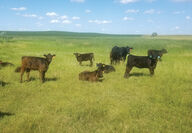
Rainfall ranks as one of the most important factors that influence ranchers' management decisions, according to North Dakota State University Extension specialists. This year is no different. Parts of North Dakota are experiencing severe dry weather while others have adequate to plentiful moisture. This situation drives management of native pasture, crop residue and cover crop acres. Typically, even with good moisture at this time of the year, the nutritional value of native pasture is in declin...

Changes in federal grazing and harvesting rules on prevented-planting acres could help North Dakota livestock producers in select counties replenish forage supplies, or at least offset shortages in perennial forage production, according to North Dakota State University Extension livestock specialists. The U.S. Department of Agriculture (USDA) will allow producers to graze, hay or cut cover crops on prevented-planting acres beginning Sept. 1. Counties included in the change are: Barnes, Benson,...

The third in a four-part webinar series hosted by gerontologists from North Dakota State University Extension and South Dakota State University Extension will take place on August 14. It will discuss aging, how aging is different from disease, and barriers and strategies to aging well. The webinar begins at noon CDT. Most people think aging happens to someone in their 60s or 70s, when in fact, all adults are aging, says Jane Strommen, NDSU Extension gerontology specialist. While chronic disease...
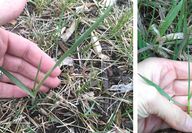
North Dakota's drought-stressed pastures, especially pastures stressed during the fall of 2017, should receive special care this spring to help them recover from the drought, North Dakota State University Extension Service grazing experts advise. "It is critical that these pastures are given adequate time to recover," says Miranda Meehan, livestock environmental stewardship specialist. "Grazing too early in the spring can result in decreased total forage production for the entire grazing...
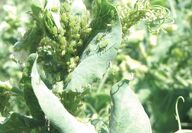
Pulse crop producers have a new tool to help them identify insect pests that attack chickpeas, field peas and lentils in the major pulse-growing areas of the U.S. The new "Pulse Crop Insect Diagnostic Series" from the North Dakota State University Extension Service summarizes insect pests of the northern Plains (Montana, North Dakota and South Dakota) and the Palouse area of the Pacific Northwest (Washington, Idaho and Oregon). The series was a collaborative effort among NDSU, University of...
Farmers, crop scouts, agronomists and other agricultural professionals will have an opportunity to enhance their pest identification and management skills at the North Dakota State University Extension Service’s 2018 Western Crop and Pest Management School. The school will be held March 6-7 at the Williston Area Recreation Center on the Williston State College campus. Participants also will be able to hear about current research results on topics such as weed control and pulse crop disease management. This is the first time the school has b...
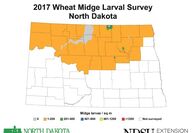
Soil samples in North Dakota indicate low levels of overwintering wheat midge larvae (cocoons) for the 2018 season, according to Janet Knodel, North Dakota State University Extension Service entomologist. A total of 201 soil samples were collected from 21 counties in the fall of 2017 to estimate the regional risk for wheat midge in 2018. The distribution of wheat midge is based on unparasitized cocoons found in the soil samples. "Less than 1 percent of the soil samples had economic population...

Keeping stored grain cool is important as outdoor temperatures fluctuate and eventually start to warm this spring, a North Dakota State University Extension Service grain storage expert advises. "Not only will daytime temperatures be increasing, but the bin works as a solar collector," Extension agricultural engineer Ken Hellevang says. More heating occurs on the south wall of a grain bin on March 1 than during the middle of the summer. "This heats the grain next to the bin wall to temperatures...
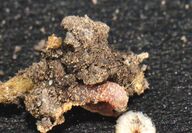
Farmers, crop scouts, agronomists and other agricultural professionals will have an opportunity to enhance their pest identification and management skills at the North Dakota State University Extension Service's 2018 Western Crop and Pest Management School. The school will be held March 6-7 at the Williston Area Recreation Center on the Williston State College campus. Participants also will be able to hear about current research results on topics such as weed control and pulse crop disease...